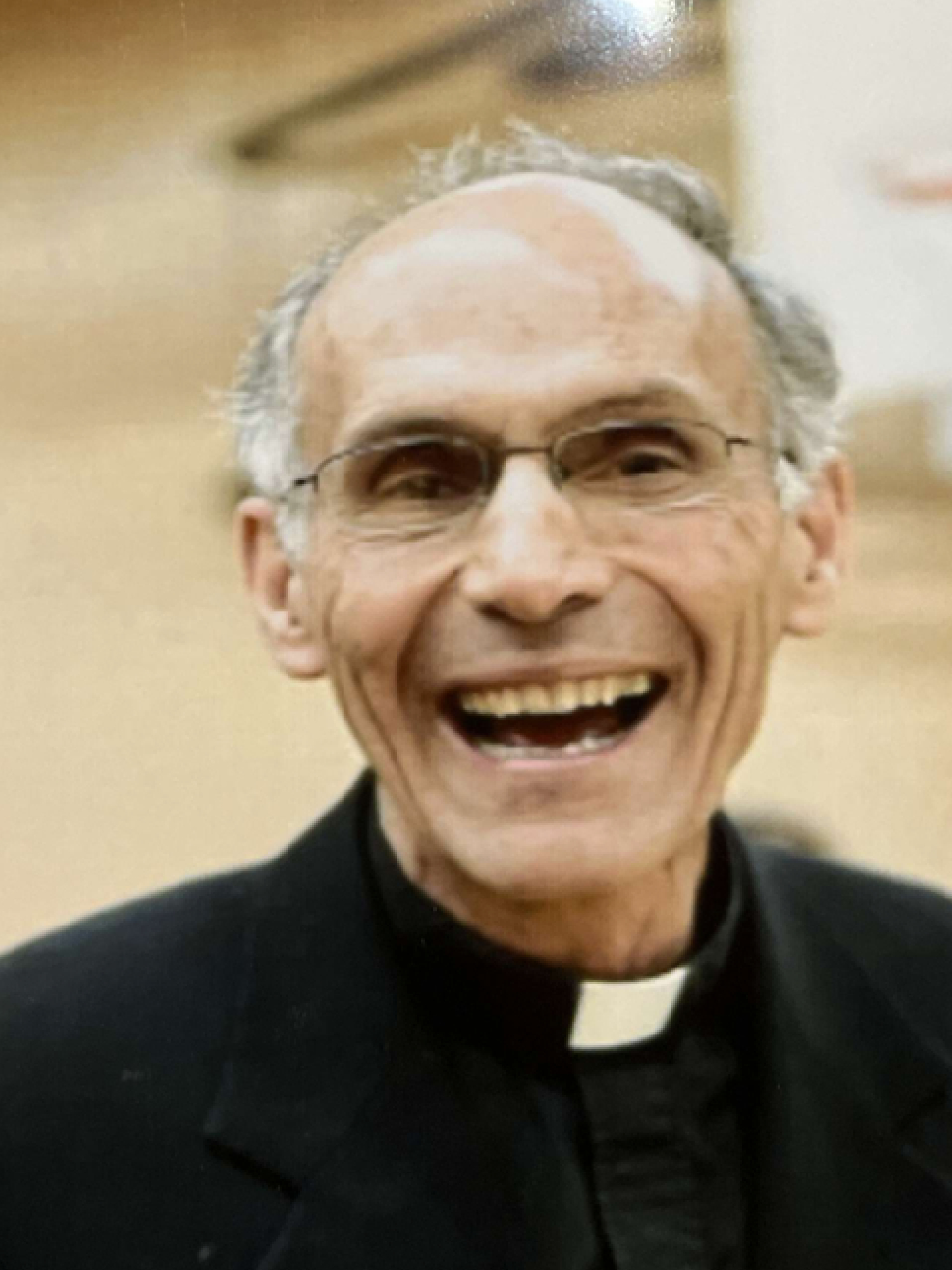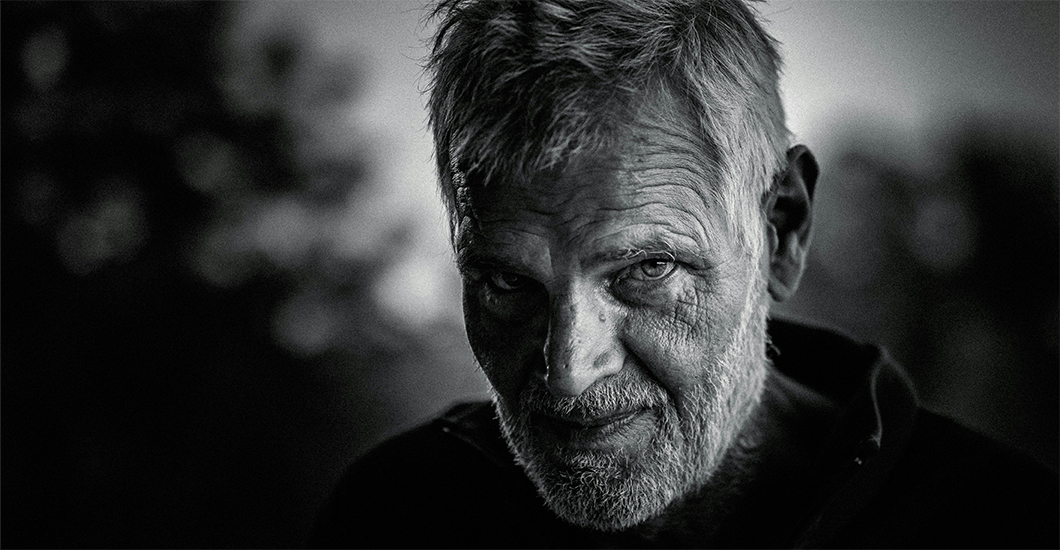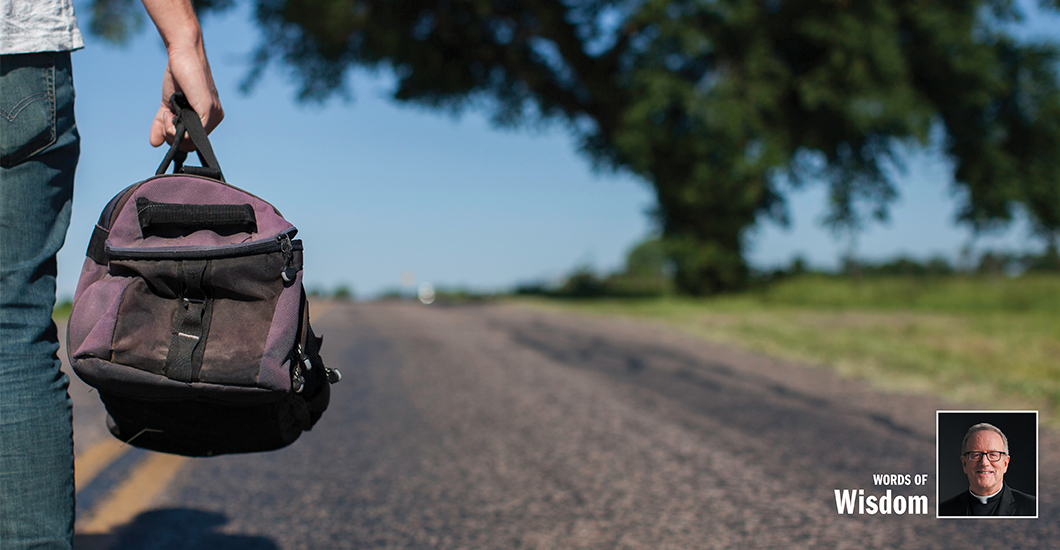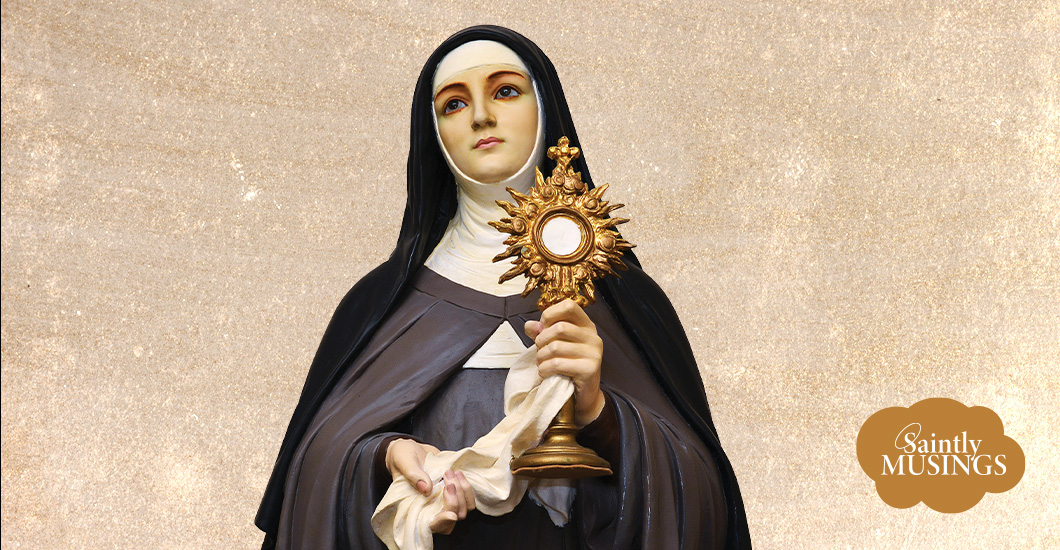Home/Evangelize/Article
Trending Articles
Stranger at the Door
What would you do when a stranger knocks at your door? What if the stranger turns out to be a difficult person?
He says his name with emphasis, in Spanish, with a certain pride and dignity, so you’ll remember who he is—Jose Luis Sandoval Castro. He ended up on our doorstep at Saint Edward Catholic Church in Stockton, California, on a Sunday evening when we were celebrating our patron feast day. Somebody had dropped him off in our relatively poor, working-class neighborhood. The music and the crowd of people apparently drew him like a magnet to our parish grounds.
Unveiling the Truth
He was a man of mysterious origins—we did not know how he arrived at the church, let alone who and where his family was. What we did know was that he was 76 years old, bespectacled, dressed in a light-colored, well-worn vest, and was pulling his luggage by hand. He carried a document from the Immigration and Naturalization Service granting him permission to enter the country from Mexico. He had been robbed of his personal documents and carried no other identification with him.
We set about exploring and discovering who Jose Luis was, his roots, his relatives, and whether they had any contact with him. He hailed from the town of Los Mochis in the state of Sinaloa, Mexico.
Anger, vitriol, and venom spewed from his mouth. He claimed that his relatives had ripped him off and robbed him of his pension in the United States, where he had worked for years, as he went back and forth to Mexico. The relatives we contacted claimed they tried to help him on various occasions, yet he called them thieves.
Who were we to believe? All we knew was that we had a wandering, regular drifter from Mexico in our hands, and we could not abandon him nor put the old, infirm man out on the street. Coldly, callously, one relative said: “Let him fend for himself on the streets.”
He was a man of bluster, bravado, and gruffness, yet he flashed signs of vulnerability again and again. His eyes would water, and he would almost sob as he told how people had wronged and betrayed him. It seemed like he was all alone, deserted by others.
The truth was—it was not easy to help him. He was ornery, stubborn, and proud. The oatmeal was either too chewy or not smooth enough, the coffee was too bitter and not sweet enough. He found fault with everything. He was a man with a gigantic chip on his shoulders, angry and disappointed with life.
“People are bad and mean, they’ll hurt you,” he lamented.
To that, I retorted that there were ‘Buena gente’ (good people) too. He was in the arena of the world where good and evil intersect, where people of goodness and kindness mixed together, like the wheat and chaff of the Gospel.
More than a Welcome
No matter his defects, no matter his attitude or his past, we knew we should welcome him and help him as one of the least of the brothers and sisters of Jesus.
“When you welcomed the stranger, you welcomed me.” We were ministering to Jesus himself, opening the doors of hospitality to him.
Lalo Lopez, one of our parishioners who took him in for a night, introduced him to his family, and took him to his son’s baseball game, observed: “God is testing us to see how good and obedient we are, as His children.”
For several days, we put him up in the rectory. He was weak, spitting out phlegm every morning. It was obvious he could no longer roam and drift freely as he was accustomed to doing in his younger days. He had high blood pressure, over 200. On one visit to Stockton, he said he was hit behind the neck near a downtown church.
A son in Culiacan, Mexico, said he “engendered me” and that he never really knew him as his dad, for he was never around, always traveling, heading for El Norte.
The story of his life began to unfold. He had worked in the fields, harvesting cherries, many years ago. He had also sold ice cream in front of a local church a few years ago. He was, to quote the Bob Dylan classic song, “like one with no direction home, like a complete unknown, like a rolling stone.”
As Jesus left the 99 sheep behind to rescue one stray sheep, we turned our attention to this one man, apparently shunned by his own. We welcomed him, housed him, fed him, and befriended him. We came to know his roots and his history, the dignity and sacredness of him as a person, and not just as another throwaway on the streets of the city.
His plight was publicized on Facebook by a woman who transmits video messages of missing persons to Mexico.
People asked: “How can we help?”
One man said: “I’ll pay for his ticket home.”
Jose Luis, an illiterate man, rough and unrefined, came to our parish fiesta, and by the grace of God, we tried, in some small way, to emulate the example of Saint Mother Teresa, who welcomed the poor, the lame, the sick, and the outcasts of the world into her circle of love, the banquet of life.
In the words of Saint John Paul II, solidarity with others is not a feeling of vague compassion or shallow distress at the misfortunes of others. It is a reminder that we commit to the good of all because we are all responsible for one another.

Father Alvaro Delgado was born in South America. His family moved to the United States when he was seven. After working as a newspaper reporter for about 17 years, he was ordained to the priesthood in 2002 and has since served in the diocese of Stockton in California.
Related Articles
The greatest evangelist is, of course, Jesus himself, and there is no better presentation of Jesus’ evangelical technique than Luke’s masterful narrative concerning the disciples on the road to Emmaus. The story opens with two people going the wrong way. In Luke’s Gospel, Jerusalem is the spiritual center of gravity— it is the locale of the Last Supper, the Cross, the Resurrection and the sending of the Spirit. It is the charged place where the drama of Salvation unfolds. So in walking away from the capital city, these two erstwhile disciples of Jesus are going against the grain. Jesus joins them on their journey—though we are told that they are prevented from recognizing Him—and He asks them what they are talking about. Throughout His ministry, Jesus associated with sinners. He stood shoulder to shoulder in the muddy waters of the Jordan with those seeking forgiveness through the baptism of John; over and again, He ate and drank with disreputable types, much to the chagrin of the self-righteous; and at the end of His life, He was crucified in between two thieves. Jesus hated sin, but He liked sinners and was consistently willing to move into their world and to engage them on their terms. And this is a first great evangelical lesson. The successful evangelist does not stand aloof from the experience of sinners, passing easy judgment on them, praying for them from a distance; on the contrary, she loves them so much that she joins them and deigns to walk in their shoes and to feel the texture of their experience. Prompted by Jesus’ curious questions, one of the travelers, Cleopas by name, recounts all of the 'things' concerning Jesus of Nazareth: “He was a prophet mighty in word and deed before God and all the people; our leaders, though, put Him to death; we thought He would be the redeemer of Israel; this very morning, there were reports that He had risen from the dead.” Cleopas has all of the 'facts' straight; there is not one thing he says about Jesus that is wrong. But his sadness and his flight from Jerusalem testify that he doesn’t see the picture. I love the clever and funny cartoons in the New Yorker magazine, but occasionally, there is a cartoon I just don’t understand. I’ve taken in all of the details, I’ve seen the main characters and the objects around them, I’ve understood the caption. Yet, I don’t see why it’s funny. And then there comes a moment of illumination: though I haven’t seen any further detail, though no new piece of the puzzle has emerged, I discern the pattern that connects them together in a meaningful way. In a word, I 'get' the cartoon. Having heard Cleopas’ account, Jesus say: “Oh, how foolish you are! How slow of heart to believe all that the prophets said.” And then He opens the Scriptures to them, disclosing the great Biblical patterns that make sense of the 'things' that they have witnessed. Without revealing to them any new detail about Himself, Jesus shows them the form, the overarching design, the meaning—and through this process they begin to 'get' Him: their hearts are burning within them. This is the second great evangelical lesson. The successful evangelist uses the Scriptures in order to disclose the divine patterns and ultimately the Pattern who is made flesh in Jesus. Without these clarifying forms, human life is a hodge-podge, a blur of events, a string of meaningless happenings. The effective evangelist is a man of the Bible, for the Scripture is the means by which we 'get' Jesus Christ and, through Him, our lives. The two disciples press Him to stay with them as they draw near the town of Emmaus. Jesus sits down with them, takes bread, says the blessing, breaks it and gives it to them, and in that moment they recognize Him. Though they were, through the mediation of Scripture, beginning to see, they still did not fully grasp who He was. But in the Eucharistic moment, in the breaking of the bread, their eyes are opened. The ultimate means by which we understand Jesus Christ is not the Scripture but the Eucharist, for the Eucharist is Christ Himself, personally and actively present. The embodiment of the paschal mystery, the Eucharist, is Jesus’ love for the world unto death, His journey into godforsakenness in order to save the most desperate of sinners, His heart broken open in compassion. And this is why it is through the lens of the Eucharist that Jesus comes most fully and vividly into focus. And thus we see the third great evangelical lesson. Successful evangelists are persons of the Eucharist. They are immersed in the rhythms of the Mass; they practice Eucharistic adoration; they draw the evangelized to a participation in the body and blood of Jesus. They know that bringing sinners to Jesus Christ is never primarily a matter of personal witness, or inspiring sermonizing, or even exposure to the patterns of the Scripture. It is primarily a matter of seeing the broken heart of God through the broken bread of the Eucharist. So prospective evangelists, do what Jesus did. Walk with sinners, open the Book, break the Bread.
By: Bishop Robert Barron
MoreAs Catholics, we have heard from the time we were little: “Offer it up.” From a little headache to a very serious emotional or physical hurt, we were encouraged to ‘offer it up.’ It wasn't until I was an adult that I pondered the meaning and purpose of the phrase, and understood it as ‘redemptive suffering.’ Redemptive suffering is the belief that human suffering, when accepted and offered up in union with the Passion of Jesus, can remit the just punishment for one's sins or the sins of another. In this life, we are going to suffer various minor and major physical, mental, emotional, and spiritual trials. We can choose to grumble about it or we can surrender it all and unite our suffering with Jesus’ Passion. It can be redemptive not only for us, we can even help someone open their heart to receive Jesus' healing and forgiveness. We may never know in this life how offering up our sufferings has helped someone else break free of the bondages that have held them for so long. Sometimes, God allows us to experience the joy of seeing someone break loose from a life of sin because we offered up our suffering for them. We can offer up our sufferings even for the poor souls in purgatory. When we finally arrive in Heaven, imagine those we were praying for and offering up our sufferings greeting us and thanking us. Redemptive suffering is one of those areas that can be difficult to fully understand, but when we look at Scripture and what Jesus taught and how his followers lived, we can see that it is something that God is encouraging us to do. Jesus, help me each day to offer up my little and big sufferings, difficulties, annoyances, and unite them to You on the Cross.
By: Connie Beckman
MoreA gift that you can access from anywhere in the world, and guess what? It’s free not just for you but for everyone! Imagine that you are lost in a deep pit of darkness and hopelessly groping around. Suddenly, you see a great light and someone reaching out to rescue you. What a relief! The overwhelming peace and joy can’t be fully expressed in words. The Samaritan woman felt like this when she met Jesus at the well. He told her: “If you knew the gift of God, and who it is that is saying to you: ‘Give me a drink,’ you would have asked Him, and He would have given you living water.” (John 4:10) As soon as she heard these words, the woman realized that she had been waiting her whole life for this. “Give me this water, so that I may never be thirsty,” she implored: (John 4:15) It was only then, in response to her request and thirst for knowledge of the Messiah, that Jesus revealed Himself to her: “I am He, the One who is speaking to you.” (John 4:26) He is the living water that quenches every thirst—the thirst for acceptance, the thirst for understanding, the thirst for forgiveness, the thirst for justice, the thirst for happiness, and most importantly, the thirst for love, God’s love. Until You Ask… The gift of Christ’s presence and mercy is available for everyone. “God proves His love for us in that, while we were still sinners, Christ died for us.” (Romans 5:8) He died for every sinner so that by the Blood of Christ, we may be cleansed from our sin and be reconciled with God. But, like the Samaritan woman, we need to ask Jesus. As Catholics, we can easily do this through the Sacrament of Penance, confessing our sins and being reconciled with God when the priest absolves us from sin, using the power given by God to act in persona Christi (in the person to Christ). It gives me great peace to frequent this Sacrament because the more I do it, the more I become receptive to the Holy Spirit. I can feel Him speaking through my heart, helping me to discern good from evil, growing in virtue as I flee from vice. The more frequently I repent of my sins and turn back to God, the more sensitive I become to the presence of Jesus in the Holy Eucharist. I become conscious of His presence in those who have received Him in Holy Communion. I feel His warmth in my heart when the priest walks past me with the ciborium filled with the Consecrated Host. Let’s be honest about it. Many people line up for Communion, but very few people line up for Confession. It is sad that many people are missing out on such a very important source of grace to strengthen us spiritually. Here are a few things that help me get the most out of Confession. Be Prepared A thorough examination of the conscience is necessary before Confession. Prepare by going through the commandments, the seven deadly sins, the sins of omission, the sins against purity, charity, etc. For a sincere confession, the conviction of sin is a prerequisite, so it is always helpful to ask God to enlighten us about certain sins we committed that are unknown to us. Ask the Holy Spirit to remind you of sins you have forgotten, or make you aware of where you have been unconsciously going wrong. Sometimes we delude ourselves into thinking that something is okay when it’s not. Once we prepare well, we can again seek the assistance of the Holy Spirit to wholeheartedly admit our failures with a contrite heart. Even if we are not approaching confession with a perfectly contrite heart, it can happen during confession itself through the grace present in the Sacrament. Regardless of what you are feeling about certain sins, it’s good to confess them anyway; God forgives us in this Sacrament if we honestly admit our sins, recognizing that we have done wrong. Be Honest Be honest with yourself about your own weaknesses and failures. Admitting struggles, and dragging them out of the darkness into the light of Christ will relieve you of paralyzing guilt and bolster you against sins you tend to commit repeatedly (such as addictions). I remember once, in confession, when I told the priest about a certain sin that I just couldn’t seem to come out of, he prayed over me to specifically receive the grace from the Holy Spirit to help overcome it. The experience was so liberating. Be Humble Jesus told Saint Faustina that “A soul does not benefit as it should from the Sacrament of Penance if it is not humble. Pride keeps it in darkness.” (Diary, 113) It is humiliating to kneel in front of another human being and openly encounter the dark areas of your life. I remember receiving a very long sermon for confessing a grave sin once and getting reprimanded for repeatedly confessing the same sin. If I can learn to look at these experiences as the loving corrections of a Father who cares so much about your soul and willingly humble myself, those bitter experiences can become blessings. The forgiveness of God is a powerful indication of His love and faithfulness. When we step into His embrace and confess what we’ve done, it restores our relationship with Him as our Father and we, His children. It also restores our relationship with one another who belong to one body—the body of Christ. The best part of receiving God’s forgiveness is how it restores the purity of our soul so that when we look at ourselves and others, we get to see God dwelling in all.
By: Cecil Kim Esgana
MoreIt is not easy to predict whether you will be successful, wealthy or famous, but one thing’s for sure– death awaits you at the end. A fair bit of my time these days is taken up practicing the art of dying. I must say, I am enjoying every moment of this exercise, at least ever since I have come to the realization that I have entered the heavy end of the scales of time. I am well and truly into and past the three score years and ten, and so I begin to think seriously: what positive preparations have I put in place for the inevitability of my demise? How stainless a life am I living? Is my life as free as possible from sin, especially the sins of the flesh? Is my ultimate aim saving my immortal soul from eternal damnation? God, in His mercy, has allowed me ‘extra time’ in this game of life, in order for me to get my affairs (especially spiritual affairs) in order before I go over the top and into the shadows of the valley of death. I had a lifetime-plus to sort these out, but like many, I neglected the most important things in life, preferring to foolishly search for more wealth, security, and instant gratification. I can’t say I’m anywhere near successful in my endeavors as the distractions of life continue to plague me, despite my senior age. This constant conflict is ever so annoying and tormenting, yet when one can still be tempted, such wasted emotions are so futile. Escaping the Inevitable Despite my Catholic upbringing and its urging to embrace and look forward to the inevitable tap on the shoulder from God’s ‘Angel of Death,’ I’m still anticipating that letter from the King congratulating me on reaching ‘the big zero.’ Of course, like many in my age bracket, I am reaching out to stave off the inevitable by embracing any incentive to help prolong my earthly existence with medicines, hygiene, diet, or by whatever means possible. Death is inevitable for everyone, even for the Pope, our loveable Aunt Beatrice, and royalty. But the longer we escape the inevitable, the more that glimmer of hope beams forth ever so faintly in our psyche—that we can push the envelope, put one more puff of breath into that balloon, extending it to its very outer utmost boundary. I suppose, in a way, that may even be the answer to successfully stretching the death date—that positiveness, that resistance to immortality. I have always thought, if I can avoid unjustifiable taxes by whatever means, then why not try avoiding the other certainty, death? Saint Augustine refers to death as: “the debt that must be paid.” Archbishop Anthony Fisher adds on: “When it comes to death, modernity is into tax evasion, so also is our present-day culture in denial about ageing, frailty, and death.” The same goes for fitness gyms. I counted just last week, five such establishments in our relatively small community, in the outer western suburb of Sydney. This frantic desire to be fit and healthy is in itself noble and commendable, providing we don’t take it too seriously as it may affect every aspect of our lives to its detriment. And sometimes, it can and does lead to narcissism. We should be confident in our ability and talents but keep in sight the virtue of humility that keeps us grounded to reality, so that we don’t wander too far from God’s guidelines for normality. To the Fullest Degree We even try to tame ageing and death, so they occur on our own terms through cosmetic and medical excesses, cryopreservation, illegally stolen organs for transplants, or the most diabolical way of trying to beat natural death by the act of Euthanasia…as if there aren’t enough mishaps that take our lives prematurely. Still, most people dread the thought of death. It can be paralyzing, bewildering, and depressing, because it will be the end of our earthly life, but it simply takes a mustard seed of faith to change all those ‘end of the world’ feelings and open up a whole new vista of hope, joy, pleasurable anticipation, and happiness. With faith in an afterlife with God and all that it entails, death is simply a necessary door that must be opened for us to take part in all the promises of Heaven. What a guarantee, given by our Almighty God, that through the belief in His son Jesus and living a life based on His instructions, after death comes life-life to the fullest degree. And so, we can confidently ask the question: “Oh death, where is thy victory, death where is thy sting?” (1 Corinthians 15:55) Smidgeon of Faith When entering the great unknown, trepidation is to be expected, but contrary to Shakespeare’s Hamlet, who said: “Death was the undiscovered country from whose bourn no traveler returns,” we who have been blessedly endowed with the gift of faith have been shown the evidence that some souls have returned from the bowels of death to give witness to that misinformation. The Catechism of the Catholic Church teaches that death is a consequence of sin. The Church's Magisterium, as authentic interpreter of the affirmations of Scripture and Tradition, teaches that death entered the world on account of man's sin. “Even though man's nature is mortal, God had destined him not to die. Death was therefore contrary to the plans of God the Creator and entered the world as a consequence of sin.” The Book of Wisdom confirms this. “God did not make death, and He does not delight in the death of the living. He created everything so that it might continue to exist and everything He created is wholesome and good.” (Wisdom 1: 13-14, 1 Corinthians 15:21, Romans 6:21-23) Without genuine faith, death seems like annihilation. Therefore, search out faith because that is what alters the idea of death to the hope of life. If the faith you possess isn’t strong enough to overcome the fear of death, then make haste to strengthen that smidgeon of faith into a full-blown belief in Him Who is Life, for after all, what is at stake is your Eternal Life. So, let’s not leave things too much to chance. Have a safe journey, see you on the other side!
By: Sean Hampsey
MoreWhat happens to your soul when you have an unexpected encounter…? I have a fond childhood memory about Eucharistic Adoration which is very dear to my heart. I participated in the rite of exposition and benediction of the Blessed Sacrament as a child, and I was mesmerized by the Eucharistic Jesus in a majestic monstrance with incense rising up towards Him. As the priest worshipped God by swinging the censer, incense rose towards the Eucharist and the whole congregation sang together, “O Sacrament Most Holy, O Sacrament Divine, All praise and all thanksgiving, Be every moment Thine.” I longed to touch the censer myself and gently push it forward so I could cause the incense to rise up to the Lord Jesus. The priest gestured to me not to touch the censer and I turned my attention to the incense smoke that rose up along with my heart and eyes to the Lord God fully present in the Eucharist. This participation in Eucharistic Adoration as a child filled my soul with so much beauty—the smell of the incense, the entire congregation singing in unison, and the vision of the Eucharistic Lord being worshipped—my senses were thoroughly satisfied, leaving me longing for the experience again. Caught Again I admit with much sadness however that several years afterwards, as a teenager—when I had more opportunities—I gave into hesitation and stayed away from Eucharistic Adoration, depriving myself of such great beauty and source of sanctity. My reason for this seems to me very silly now. I thought I had to continuously pray for the entire one hour of Eucharistic Adoration and it seemed like a very long time. How many of us today hesitate to go to Eucharistic Adoration for similar reasons? We sometimes feel stressed, bored, lazy or even afraid about going to Eucharistic Adoration and we deprive ourselves of this great gift. I say, the trick is to just start going and soon you wouldn’t want to stop. Stronger than Ever Life threw its share of struggles and trials at me in my young adulthood; recalling where I had received such comfort, I turned to God for strength and sustenance. One specific way I turned to God is by going to Eucharistic Adoration on First Fridays. I began by sitting silently in the presence of Jesus in the Blessed Sacrament for a whole hour, first, simply allowing myself to be there; and then just talking to the Lord about my life, asking for His help and telling Him that I loved Him. Have you ever thought of the possibility of simply showing up in front of the Eucharistic Jesus and doing nothing but staying in His divine presence for an hour? For me, as years went by, I found that spending time at Eucharistic Adoration has changed my life in profound ways, as I become more and more aware of my deepest identity as a beloved daughter of God. We know that our Lord Jesus is truly and fully present in the Eucharist, His body, blood, soul and divinity. The Eucharist is Jesus Himself. Spending time with the Eucharistic Jesus can cleanse you from your sins and fill you with His great love for you. Let us always be fervent, to spend one hour with our God, who continues to be with us in the Eucharist, to the end of the age. Our personal relationship with our God will develop and become stronger and stronger, the more we spend time with the Lord Jesus in Eucharistic Adoration. I assure you that it will become easier, therefore, do not give in to the initial hesitation and do not be afraid in any way to spend time with our Eucharistic Lord, who is love and mercy itself, goodness and goodness alone.
By: Pavithra Kappen
MoreDid you know that we have all been invited to the Greatest Feast in the history of mankind? A few years ago, I was reading the story of the birth of Dionysus with my students. Persephone, the legend goes, was impregnated by Zeus and asked to see him in his true form. But a finite creature cannot look upon an eternal being and live. So, the mere sight of Zeus caused Persephone to explode, there and then, on the spot. One of my students asked me why we don’t explode when we receive the Eucharist. I told him I didn’t know, but it couldn’t hurt to be prepared. The Approach Every day, and in every Catholic church around the world, a great miracle is at work—the greatest miracle in the history of the world: the Creator of the universe is incarnate on the altar, and we are invited to approach that altar to take Him in our hands. If we dare. There are some who argue—and convincingly—that we shouldn’t dare to walk up and grab the Eucharist as though it were a theater ticket or a drive-through order. There are others who argue, and convincingly, that the human hand makes a worthy throne for such a humble King. Either way, we should be prepared. In 2018, I visited the Tower of London with my family. We stood in line for an hour and a half to see the Crown Jewels. An hour and a half! First, we were issued tickets. Then, we sat through a documentary video. Shortly after, we were ushered through a winding series of velvet, roped corridors past silver and gold vessels, suits of armor, lavish and costly outfits of fur, satin, velvet, and woven gold…until at last, we were granted a brief glimpse of the crown through bullet-proof glass and over the shoulders of heavily armed guards. All that just to see the Queen’s crown! There is something infinitely more precious at every Catholic Mass. We should be prepared. We should be trembling. Mobs of Christians should be fighting for a glimpse of this miracle. So, where is everybody? Quarantine Miracle During the pandemic, when the Church doors were closed to the faithful, and we were forbidden—well, you were forbidden—from witnessing this miracle in person, how many begged the Church to have the courage to trust that we’d rather die than be deprived of this miracle? (Don’t get me wrong. I don’t blame the Church’s decision which was based on the very best medical advice.) I don’t remember hearing about any outrage, but then, I was busy hiding in the cloister, sterilizing countertops, and doorknobs. What would you give to have been there at Cana when Jesus worked His first miracle—to stand in the presence of the Queen of Heaven? What would you give to have been there on that first Holy Thursday night? Or to have stood at the foot of the Cross? You can. You’ve been invited. Be aware and be prepared.
By: Father Augustine Wetta O.S.B
MoreWe are all looking for ‘immersive’ experiences, but what of the ultimate experience we have been freely given? During the Worldwide Developers Conference in California, Apple introduced its Vision Pro headset, a head-mounted device resembling oversized swimming goggles. Essentially, it functions as a comprehensive computer, smartphone, and home theatre, incorporating virtual reality, augmented reality, and mixed reality technologies. Many consider this product to be the future of smartphones. With the Vision Pro headset, users can control their visual experience, actions, and even thoughts using voice commands and hand and finger gestures in the air. My brain popped. Imagine the possibilities! But could the use of this headset raise concerns about increased social isolation and a decline in shared experiences? For instance, if it replaces the traditional cinema room with large televisions where families not only watch something together but also bond with each other, wouldn’t this technology endanger core human connections? But what if there is an immersive experience that does not destroy the experience of communion? Getting Connected Have you ever considered that when we receive the Blessed Sacrament, God is giving us the most amazing immersive experience ever? By creating us in His image and likeness, God gifted us with His desire for shared experience and union. In its fullness, this is a desire for union with God Himself. As the psalmist writes: “As a deer longs for flowing streams, so my soul longs for you, O God. My soul thirsts for God.” (Psalm 42: 1-2) However, our contemporary culture has perverted this longing into an obsession with sex, power, money, and belongings. Sin has corrupted our desire for holistic union. Jesus expresses His longing for communion with us when He tells the apostles: “I have eagerly desired to eat this Passover with you…” (Luke 22:15). He desired to be in communion with us so much, that He commanded us to eat and drink Him–to be so united with Him that our bodies are commingled. The Eucharist is not a one-man show. It is a shared experience of a community around the table sharing one cup and one bread. Participation is its core. Richard Hooker, a theologian writes that 'participation' refers to the reciprocal and intimate connection between Christ and believers where Christ holds us, and we hold Christ. In this bond, there is a sense of sharing one another through a unique relationship, shared interests, and a profound union. Christ is truly present in the bread and wine, and it is radical faith. If we believe Christ is present universally, why would it be hard to believe that he is truly present in the consecrated host and wine? This presence is designed for intimate communion by eating and drinking. As we leave the church, we carry His presence into the world. Then, as we pour out ourselves in service to others, we draw them into His presence.
By: Father Bony Abraham
MoreLoneliness is the new normal worldwide, but not for this family! Read on for this incredible tip on staying connected always. I recently became an empty nester. All five of my children live hours apart from one another, which makes family gatherings few and far between. This is one of the bittersweet consequences of successfully launching your children; they can fly pretty far sometimes. Last Christmas, our whole family had the happy occasion of visiting with each other. At the end of those three joyful days, when it was time for goodbyes, I overheard one sibling say to another: “I’ll see you in the Eucharist.” This is the way. This is how we stay close to one another. We cling to the Eucharist. And Jesus binds us together. We certainly miss one another and wish we had more time together. But God has called us to work in different pastures and to be content with the time we’ve been given. So, in between visits and phone calls, we go to Mass and continue to stay connected. Feeling Alone? Attending the Most Holy Sacrifice of the Mass allows us to enter into a reality that’s not bound by space and time. It’s the stepping out of this world and into a sacred space where Heaven touches Earth in a real way, and we are united with the entire family of God, those worshiping both here on Earth and in Heaven. By partaking in Holy Communion, we find that we indeed are not alone. One of Jesus’ last words to His disciples was: “I am with you always, to the end of the age.” (Matthew 28:20) The Eucharist is the immense gift of His continual Presence with us. Naturally, we miss loved ones who are no longer with us; sometimes, the ache can be quite fierce. It is in those moments that we must cling to the Eucharist. On particularly lonesome days, I make an extra effort to get to Mass a little early and linger a little longer afterward. I intercede for each of my loved ones and receive comfort knowing I am not alone and that I am close to Jesus’ Heart. I pray that each of my loved one’s hearts are also close to Jesus’ Heart, so we can also be together. Jesus promised: “And I, when I am lifted up from the earth, will draw all people to Myself.” (John 12:32) Incredibly Close One of my favorite lines during the Eucharistic Prayer is this: “Humbly we pray that partaking of the body and blood of Christ, we may be gathered into one by the Holy Spirit.” God gathers what once was scattered and draws us into the one body of Christ. The Holy Spirit at Mass has been tasked in a particular way with uniting us. We absolutely need God’s help to be in true communion with others. Have you ever been in the same room with someone, but yet it felt like you were a million miles away? The opposite of that can also be true. Even if we are miles apart, we can feel incredibly close to others. Ultimate Reality Last year, I felt particularly close to my grandmother at her funeral Mass. It was very comforting, for I felt like she was right there with us, especially during the Eucharistic prayer and Holy Communion. My grandmother had a strong devotion to the Eucharist and strove to attend daily Mass for as long as she physically could. I was so grateful for that time of intimacy with her and will always treasure that. This reminds me of another portion of the Eucharistic prayer: “Remember also our brothers and sisters who have fallen asleep in the hope of the resurrection and all who have died in Your mercy: welcome them into the light of Your face. Have mercy on us all, we pray, that with the Blessed Virgin Mary, Mother of God, with Blessed Joseph, Her Spouse, with the Blessed Apostles, and all the Saints who have pleased You throughout the ages, we may merit to be co-heirs to eternal life, and may praise and glorify You through Your Son, Jesus Christ.” While at Mass or Eucharistic Adoration, we are in the Real Presence of our Lord and Savior Jesus Christ. We are also joined by the Saints and Angels in Heaven. One day we will see this reality for ourselves. For now, we believe with the eyes of faith. Let us take courage whenever we feel lonely or are missing a loved one. Jesus’ Loving and Merciful Heart is constantly beating for us and yearning for us to spend time with Him in the Eucharist. This is where we find our peace. This is where our hearts are fed. Like Saint John, let us rest peacefully on the loving breast of Jesus and pray that many others will find their way to His Sacred Eucharistic Heart. Then, we will be truly together.
By: Denise Jasek
MoreQ - My many Christian friends celebrate ‘Communion’ every Sunday, and they argue that the Eucharistic presence of Christ is only spiritual. I believe Christ is present in the Eucharist, but is there any way to explain it to them? A – It is indeed an incredible claim to say that at every Mass, a small piece of bread and a small chalice of wine become the very flesh and blood of God Himself. It is not a sign or a symbol, but truly the body, blood, soul, and divinity of Jesus. How can we make this claim? There are three reasons why we believe this. First, Jesus Christ said so Himself. In John’s Gospel, Chapter 6, Jesus says: “Amen, amen, I say to you, unless you eat the flesh of the Son of Man and drink His blood, you do not have life within you. Whoever eats My flesh and drinks My blood has eternal life, and I will raise him on the last day. For My flesh is true food, and My blood is true drink. Whoever eats My flesh and drinks My blood remains in Me and I in him.” Whenever Jesus says, “Amen, Amen, I say to you…”, this is a sign that what He is about to say is completely literal. Further, Jesus uses the Greek word trogon which is translated ‘to eat’—but really means ‘to chew, gnaw, or rip with one’s teeth.’ It’s a very graphic verb which can only be used literally. Also, consider the reaction of His hearers; they walked away! It says in John 6: “as a result of this [teaching], many of His disciples returned to their former way of life and no longer accompanied Him.” Does Jesus chase them down, tell them that they misunderstood Him? No, He allows them to leave—because He was serious about this teaching that the Eucharist is truly His flesh and blood! Second, we believe because the Church has always taught it from its earliest days. I once asked a priest why there was no mention of the Eucharist in the Creed which we profess every Sunday—and he replied that it was because no one debated His Real Presence, so it wasn’t necessary to officially define it! Many of the Church Fathers wrote about the Eucharist—for example, Saint Justin Martyr, writing around the year 150 AD, penned these words: “For not as common bread and common drink do we receive these; but we have been taught that the food which is blessed by the prayer of His word, and from which our blood and flesh are nourished, is the flesh and blood of that Jesus who was made flesh.” Every Church Father is in agreement—the Eucharist is truly His flesh and blood. Finally, our faith is strengthened through the many Eucharistic miracles in the history of the Church—over 150 officially documented miracles. Perhaps the most famous occurred in Lanciano, Italy in the 800s, where a priest who doubted Christ’s presence was shocked to find that the Host became visible flesh, while the wine became visible as blood. Later scientific tests discovered that the Host was heart flesh from a human male, type AB blood (very common among Jewish men). The heart flesh had been badly beaten and bruised. The blood had congealed into five clumps, symbolizing the five wounds of Christ, and miraculously the weight of one of the clumps is equal to the weight of all five taken together! Scientists cannot explain how this flesh and blood has lasted for twelve hundred years, which is an inexplicable miracle in itself. But how can we explain how this happens? We make a distinction between accidents (what something looks like, smells like, tastes like, etc) and substance (what something actually is). When I was a young child, I was at my friend’s house, and when she left the room, I saw a cookie sitting on a plate. It looked delectable, smelled like vanilla, and so I took a bite…and it was soap! I was so disappointed, but it taught me that my senses could not always decipher what something actually is. In the Eucharist, the substance of bread and wine change into the substance of Christ’s body and blood (a process known as transubstantiation), while the accidents (the taste, smell, look) remain the same. It does indeed take faith to recognize that Jesus is truly present, since it cannot be perceived by our senses, nor is it something we can deduce with our logic and reason. But if Jesus Christ is God and He cannot lie, I am willing to believe that He is not a sign or symbol, but truly present in the Most Blessed Sacrament!
By: Father Joseph Gill
MoreSomething made me stand still that day…and everything changed. I was about to start my rosary group at the nursing home where I work as a pastoral care practitioner when I noticed 93-year-old Norman sitting in the chapel alone, looking forlorn. His Parkinson's tremors seemed quite pronounced. I joined him and asked how he was doing. With a defeated shrug of his shoulders, he muttered something in Italian and became quite tearful. I knew that he was not in a good place. The body language was very familiar to me. I had seen it in my dad a few months before he died—the frustration, sadness, loneliness, angst of ‘why do I have to continue living like this,’ physical pain evident from the furrowed head and glassy eyes… I became emotional and could not speak for a few moments. In silence, I put my hand on his shoulders, assuring him that I was there with him. A Whole New World It was morning tea time. I knew that by the time he manages to shuffle to the dining room, he would miss the tea service. So, I offered to make him a cuppa. In my minimal Italian, I was able to discern his preferences. At the nearby staff kitchen, I made him a cup of tea, with milk and sugar. I cautioned him that it was quite hot. He smiled, indicating that’s how he liked it. I stirred the drink many times as I did not want him to get scalded, and when we both felt it was the right temperature, I offered it to him. Because of his Parkinson’s, he could not hold the cup steady. I assured him that I would hold the cup; with mine and his trembling hand, he sipped the tea, smiling so delightfully as if it was the best drink he ever had in his lifetime. He finished every single drop! His shaking soon stopped, and he sat up, more alert. With his distinguished smile, he exclaimed: “Gracias!” He even joined the other residents who soon ambled to the chapel, and he stayed on for the Rosary. It was only a cup of tea, yet it meant the whole world to him—not only to quench a physical thirst but also an emotional hunger! Reminiscent While helping him drink his cuppa, I remembered my dad. The times he enjoyed the meals we had together without rushing, sitting with him at his favorite spot on the sofa as he struggled with his cancer pains, joining him in his bed listening to his favorite music, watching healing Masses together online… What drew me to meet Norman at his need that morning? Surely it was not my weak and carnal nature. My plan was to set up the chapel quickly as I was running late. I had a task to accomplish. What made me stand still? It was Jesus, who enthroned His grace and mercy in my heart to respond to the needs of someone. At that moment, I realized the profoundness of Saint Paul’s teaching: “It is no longer I who live, but it is Christ who lives in me.” (Galatians 2:20) I wonder when I reach Norman’s age and I long for a cappuccino, ‘with almond milk, half strength, extra hot,’ will someone make one for me with such mercy and grace too?
By: Dina Mananquil Delfino
MoreLatest Articles
Tom Holland’s magnificent book Dominion develops in detail what amounts to a very simple proposition—namely, that Christianity is responsible for many of the central values that we take for granted and that we assume to be universal. In point of fact, he avers, our insistence upon the dignity of the individual, fundamental human rights, the principle of equality, and perhaps above all that the poor, the marginalized, and the victimized ought to be specially cherished, flows from basic Christian convictions. What prompted Holland to investigate this claim initially was his extensive work in the history of ancient Rome. The longer and more deeply he looked at Roman society, the stranger it seemed, the less like our own time. And the more he studied the great heroes of Rome, the more alien and morally problematic they appeared. To give just one example among many, he urges us to consider perhaps the most impressive of ancient Roman personalities, Julius Caesar. Eager to enhance his political reputation, Caesar embarked on a military campaign in Gaul (present-day France). His remarkable success in subduing this land and making it a Roman province served to cover him in glory and became the subject of his book The Gallic Wars, which is read to this day. But what is rarely remarked upon is the staggering fact that in the course of this conquest, Caesar killed, by conservative estimate, one million people and enslaved another million or so more. Now, Caesar had a boatload of enemies in Rome who suspected him of lusting after kingly power. But what Holland finds fascinating is that none of his opponents were scandalized by his murderous rampage through Gaul. In fact, all of Rome praised him for it. So the question arises: Why would we today consider someone who killed and enslaved on such a massive scale a scoundrel while even the best and brightest in ancient Roman society considered Caesar a hero? The answer, in a word, is Christianity. What the early Christians brought to Roman culture was the belief in the one God who made every human being in His image and likeness and who thereby endowed them with rights, freedom, and dignity. Moreover, the Christians taught, the Creator God became human and went willingly to the very limits of suffering and degradation, in Saint Paul’s words, “accepting even death, death on a cross.” They proclaimed a Savior who was a victim of Roman tyranny and whom God raised from the dead. And by this proclamation, they brought all the tyrannized, all of the victimized, all of the weak and forgotten from the margins to the center. These beliefs were, of course, initially regarded as absurd, and the early Christians were brutally persecuted for them. But over time, and through the witness and practice of courageous people, these beliefs soaked into the fabric of Western society. So deeply did they penetrate our consciousness that we came, as Holland has argued, to take them for granted and to mistake them for general humanistic values. Now, why is all this important to us today? We live in a time when the Christian faith is rather regularly denigrated by those in the upper echelons of elite society, in the universities, and in the media. Moreover, armies of people, especially the young, are disaffiliating from the churches and ceasing to engage in religious ritual and practice. Harmless enough, you might think, or even to the advantage of a society reaching maturity through secularization? Think again. As Christian faith and praxis evanesce, the values that Christianity has inculcated in our culture evanesce as well. Cut flowers may bloom for a time once they’ve been ripped from the soil and placed in water, but they will fade soon enough. We delude ourselves if we think that the values instilled in us by Christianity will long survive the demise of Christianity itself. Signs of the emergence of a neo-paganism in fact abound. In many states in our country, as well as in Canada and many European countries, a regime of euthanasia holds sway. When elderly or sick people become inconvenient, they can and should be eliminated. And, of course, in most countries in the West, when a child in the womb is judged to be a problem, he or she can be aborted at any point in pregnancy, up to the moment of birth. In my home state of Minnesota, a proposal has been made to enshrine this ‘right’ to the murder of the unborn in the constitution. How like this is, by the way, to the ancient Roman practice of exposing unwanted newborns to the elements and the animals. And how fascinating, in light of Tom Holland’s analysis, that the early Christians got the attention of the environing Roman culture precisely by their willingness to rescue and take in these abandoned babies. So, what is the needful thing? Christians must raise their voices in protest against the culture of death. And they must do so by claiming and publicly proclaiming the values that come from their faith. For too long, believers have been cowed into silence by the insinuation that religion is a ‘private’ matter. Nonsense. Christian values have informed our society from the beginning and have provided the coherent moral framework that most of us still take for granted. Now is not the time for quietude. It is time for us to shout our convictions from the rooftops.
By: Bishop Robert Barron
MoreQ – Later this year, my brother is getting civilly married to another man. I am very close with my brother, but I know that marriage is between a man and a woman. Would I be allowed to attend his wedding? A—This question is becoming increasingly pressing, as so many of our family and friends live lifestyles that contradict God's revealed plan for our fulfillment. Such a quandary can cause great angst since we want to love our family and support them, even if we disagree with their choices. At the same time, we cannot betray what we know to be true, as we believe that God’s plan leads to authentic happiness. The Catechism of the Catholic Church (Paragraph 1868) deals with this when it speaks about ways in which we can cooperate in someone else’s sinful choice. We participate in someone else’s sin when we ‘praise or approve’ of the sinful action. In the case of someone making a lifestyle choice that goes against our Catholic Faith, it would be morally wrong for us to in any way congratulate or celebrate this choice, which ultimately harms their relationship with God and puts their salvation in jeopardy. So what would be the best course of action? I would recommend an honest conversation with your brother. Share your deep love for him, and how you desire this relationship to continue being close. At the same time, share with him how your faith and conscience teach you that you cannot approve of things that you know to be wrong. Do not attend the wedding, send a gift, or congratulate him, but be sure to let him know that you are still there for him. Emphasize that it is not out of ‘hate’ or ‘bigotry’ that you cannot attend the wedding, but out of a firm and unchanging belief that God created marriage as something sacred between a man and a woman. This may or may not cause strife and conflict in your family. But we must never forget that Jesus promised: “Not to bring peace, but the sword”. He said that we must follow Him above any other relationship, including that of family and friends. This is certainly one of His difficult teachings, but we remember that truth and love are never in opposition, and to truly love your brother, you must love him according to the truth that Christ reveals. Never forget, too, the power of prayer and fasting. Pray and fast before your conversation with your brother so that his heart may be open to your goodwill, and pray and fast after the conversation so that he may experience a deep conversion to Christ, Who alone fulfills the human heart. Do not be afraid to choose Christ over your family, and continue to love your family— in and through Christ— regardless of your brother’s reaction. Do not be afraid, but continue to love in truth.
By: Father Joseph Gill
MoreIn the year 1240, Emperor Frederick II of Sweden was at war with the Pope, and he sent his warriors to attack Italy. The cruel soldiers decided to break into the cloistered convent of San Damiano, which was located on the border of the town of Assisi. This was where Mother Clare and the nuns under her care resided. The poor nuns were terrified and immediately rushed to their Mother to share the news. Mother Clare was bedridden, but with the help of the sisters, she got up and calmly went to the chapel. Prostrating herself in front of the Eucharist, she tearfully implored God to protect the helpless sisters. Suddenly, she heard a voice from the tabernacle: “I will always protect you!” Filled with confidence and trust, she took the ciborium containing the Blessed Sacrament and went to face the invaders. As she raised it in front of them, the soldiers were thrown into confusion and utter fear. They instantly fled the convent, abandoning their evil schemes. To the nuns, their mother’s unwavering devotion to the Holy Eucharist was a great lesson. Saint Clare, in her great humility, instructed the sisters not to reveal the voice they heard from the Blessed Sacrament until after her death. Let us, inspired by Saint Clare, grow in our devotion to Jesus in the Eucharist and put our complete trust in Him.
By: Shalom Tidings
MoreWith every act, we are aiming an arrow. Do we end up saying “Uh oh! Can I have a do over?” every time? The conversation began the night before, as so many others do, innocently enough. It was on the short drive home that I recognized a sense of uneasiness. After reflecting on words I shared earlier with my friend, I wondered if what I was feeling was that familiar nudge from the Holy Spirit. Perhaps I had once again strayed outside the boundary lines that Psalm 16: 6-7 describes? “The boundary lines have fallen for me in pleasant places; I have a goodly heritage. I bless the Lord who gives me counsel; in the night also my heart instructs me.” Pulling into the driveway, I quickly dismissed the thought...After all, this woman approached me with problems she was encountering with a couple of other women, and I was trying to be empathetic and understanding in my response. Fighting my Dilemma The next morning, however, it was clear that the Psalmist’s experience was now mine: the Lord indeed “counsels me; even at night my heart instructs me.” Upon waking, something I’d learned some years ago about the power of our words immediately came to mind. Yes, everything I’d shared the night before was True. It was also Helpful, in the context of my relationship with this person. It was in the middle of the acronym, T.H.I.N.K. that it struck me. My response didn’t fit the definition of Inspiring! Sadly, it could hardly be considered Necessary either! Fortunately, my examination ended on a positive note, as my comments could be perceived as Kind, since I remembered listing the beautiful attributes I’d observed in each of these women while we were discussing my friend’s concerns. Just as most of us have a particular flavor of ice cream, or other favorite food we indulge in again and again, so too, we may have a particular sin that we find ourselves choosing to entertain over and over. (The story of a man confessing to the priest that he had been having impure thoughts comes to mind...The priest asks: “Did you entertain them?” The penitent replies: “No, but they sure entertained me!”) I recognized that I had given in to my particular ‘flavor’ of sin, which I frequently confessed, but found myself repeating nonetheless…But my Confession didn’t elicit a chuckle from me, as the man’s in the story might have! Pondering my dilemma, I wondered what questions might others in a similar position consider...What might that ‘favorite flavor of sin’ be for someone else? What might they, too, have confessed again and again to God, to a priest, or even to a friend they trust? Moments of Growing up The Greek translation of the word ‘sin’ in the Bible is the word ‘hamartano’, meaning a person shooting an arrow, but missing the bull’s eye. The one who missed the mark was said to have sinned. Despite my best intentions, I’d missed the mark! After talking it over with the Lord that morning, I texted my friend. Only after asking for her forgiveness, and then sharing an insight that came to me as I was typing, did the root of my ‘hamartano’ finally dawn on me. In my text, I wrote: “My enjoyment of using words and sharing stories and conversations with people overrode my desire to avoid using my tongue in ways that weren’t necessary or inspiring.” I ended the text inviting her to hold me accountable if I wandered outside those ‘boundary lines’ in the future. I soon received a text back: “No matter how long we’ve been walking with Jesus we continue to have our growth moments. You are forgiven! I agree our conversation went on longer than it should have, which put us in a dangerous territory. I’ll do my best to be more aware of those situations and also to hold you accountable, if needed, and ask that you do the same for me. Thank the Lord for His grace and mercy, and for showing us where we need to do better.” Appreciating both my friend’s gracious reply as well as her honesty, I was encouraged to ‘do better!’ I realized that since it’s clear there must be something in us that we are feeding by indulging in, or by entertaining our most common temptation, it’s imperative we get to the root of the resultant behavior. By asking the Holy Spirit to reveal this root to us, we receive insight as to why we miss the mark repeatedly in this area. What happened to us in our past that created a void we choose to fill through our particular flavor of sin? What need or desire are we feeding by this indulgence? Is there a wound festering from our brokenness that needs healing? What might be a healthier response we could consider that would not only avoid hurting others, but also, allow us to offer ourselves compassion and grace in our weakness? Knowing we are to ‘love our neighbor as ourselves,’ seeking to love others necessitates growing in loving ourselves, too, does it not? Sow, Cultivate & Prune Sometimes, we persist in the same behavior for years. Without someone having the courage to respond as my friend did, we continue in patterns that limit the Holy Spirit’s efforts to conform us more and more to the image of Christ. We may try to change, but unless we are motivated sufficiently, perhaps through asking another to be our accountability partner, we may give up and go back to our flavor of choice. Whether it’s rocky road ice cream, or my choice of unnecessary words, the Lord wants us to know how much more enjoyable our lives and the lives of others around us could be if we would allow His Spirit to lead us to other options. I knew I needed to find a way to replace this tendency that I so easily fell into. I asked my friend to help me to be accountable when she observed me beginning to go down that familiar path again. Since all our efforts to avoid sin are to lead to better emulating the character of Jesus, Galatians 5:22-23 came to mind. I could choose to satisfy my hunger with one of the fruits of the Spirit, rather than my particular flavor of sin. Bearing the fruit of love, joy, peace, patience, kindness, goodness, faithfulness, gentleness, and self-control are evidence of the Holy Spirit’s partnering with us in our efforts to be more like Christ. Practice may not make perfect, but it does make progress! By directing my intention toward practicing one of these qualities, I knew I would eventually see the fruit of righteousness. Each fruit begins with a seed being sown, then fertilized, cultivated, and pruned, until, eventually we see the right behavior. In the meantime, I will begin by fertilizing my mind with reminders like the proverb: "Words are like arrows; once shot they cannot be called back." Now that I know the root of my behavior, and have invited my friend to hold me accountable, I am making the choice to focus on exercising self-control, ending conversations with others when I sense they are ‘putting us in dangerous territory,’ as my friend so succinctly pointed out. Having seen and tasted that the Lord is good, I know that only He can truly satisfy the desires of my heart. Psalm 16:8 continues: “I keep the Lord always before me; because He is at my right hand, I shall not be moved.” I lift my arrow once again to aim for the target. With His grace, in time, my arrowhead will come closer to the mark. Committed to being His disciple, I will follow Jesus, who is The Way…Home. Surely goodness and mercy shall follow me all the days of my life, and I shall dwell in the house of the Lord my whole life long. (Psalm 23:6)
By: Karen Eberts
More














